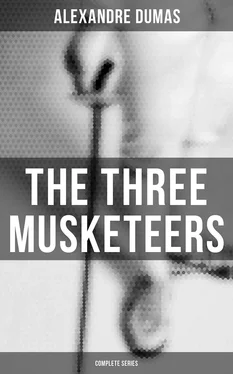“Is it my equipment?”
“Yes and no,” replied Mousqueton.
“Well, but can’t you speak?”
“Come, monsieur.”
Porthos rose, saluted his friends, and followed Mousqueton. An instant after, Bazin made his appearance at the door.
“What do you want with me, my friend?” said Aramis, with that mildness of language which was observable in him every time that his ideas were directed toward the Church.
“A man wishes to see Monsieur at home,” replied Bazin.
“A man! What man?”
“A mendicant.”
“Give him alms, Bazin, and bid him pray for a poor sinner.”
“This mendicant insists upon speaking to you, and pretends that you will be very glad to see him.”
“Has he sent no particular message for me?”
“Yes. If Monsieur Aramis hesitates to come,” he said, “tell him I am from Tours.”
“From Tours!” cried Aramis. “A thousand pardons, gentlemen; but no doubt this man brings me the news I expected.” And rising also, he went off at a quick pace. There remained Athos and d’Artagnan.
“I believe these fellows have managed their business. What do you think, d’Artagnan?” said Athos.
“I know that Porthos was in a fair way,” replied d’Artagnan; “and as to Aramis to tell you the truth, I have never been seriously uneasy on his account. But you, my dear Athos—you, who so generously distributed the Englishman’s pistoles, which were our legitimate property—what do you mean to do?”
“I am satisfied with having killed that fellow, my boy, seeing that it is blessed bread to kill an Englishman; but if I had pocketed his pistoles, they would have weighed me down like a remorse.
“Go to, my dear Athos; you have truly inconceivable ideas.”
“Let it pass. What do you think of Monsieur de Treville telling me, when he did me the honor to call upon me yesterday, that you associated with the suspected English, whom the cardinal protects?”
“That is to say, I visit an Englishwoman—the one I named.”
“Oh, ay! the fair woman on whose account I gave you advice, which naturally you took care not to adopt.”
“I gave you my reasons.”
“Yes; you look there for your outfit, I think you said.”
“Not at all. I have acquired certain knowledge that that woman was concerned in the abduction of Madame Bonacieux.”
“Yes, I understand now: to find one woman, you court another. It is the longest road, but certainly the most amusing.”
D’Artagnan was on the point of telling Athos all; but one consideration restrained him. Athos was a gentleman, punctilious in points of honor; and there were in the plan which our lover had devised for Milady, he was sure, certain things that would not obtain the assent of this Puritan. He was therefore silent; and as Athos was the least inquisitive of any man on earth, d’Artagnan’s confidence stopped there. We will therefore leave the two friends, who had nothing important to say to each other, and follow Aramis.
Upon being informed that the person who wanted to speak to him came from Tours, we have seen with what rapidity the young man followed, or rather went before, Bazin; he ran without stopping from the Rue Ferou to the Rue de Vaugirard. On entering he found a man of short stature and intelligent eyes, but covered with rags.
“You have asked for me?” said the Musketeer.
“I wish to speak with Monsieur Aramis. Is that your name, monsieur?”
“My very own. You have brought me something?”
“Yes, if you show me a certain embroidered handkerchief.”
“Here it is,” said Aramis, taking a small key from his breast and opening a little ebony box inlaid with mother of pearl, “here it is. Look.”
“That is right,” replied the mendicant; “dismiss your lackey.”
In fact, Bazin, curious to know what the mendicant could want with his master, kept pace with him as well as he could, and arrived almost at the same time he did; but his quickness was not of much use to him. At the hint from the mendicant his master made him a sign to retire, and he was obliged to obey.
Bazin gone, the mendicant cast a rapid glance around him in order to be sure that nobody could either see or hear him, and opening his ragged vest, badly held together by a leather strap, he began to rip the upper part of his doublet, from which he drew a letter.
Aramis uttered a cry of joy at the sight of the seal, kissed the superscription with an almost religious respect, and opened the epistle, which contained what follows:
“My Friend, it is the will of fate that we should be still for some time separated; but the delightful days of youth are not lost beyond return. Perform your duty in camp; I will do mine elsewhere. Accept that which the bearer brings you; make the campaign like a handsome true gentleman, and think of me, who kisses tenderly your black eyes.
“Adieu; or rather, AU REVOIR.”
The mendicant continued to rip his garments; and drew from amid his rags a hundred and fifty Spanish double pistoles, which he laid down on the table; then he opened the door, bowed, and went out before the young man, stupefied by his letter, had ventured to address a word to him.
Aramis then reperused the letter, and perceived a postscript:
P.S. You may behave politely to the bearer, who is a count and a grandee of Spain!
“Golden dreams!” cried Aramis. “Oh, beautiful life! Yes, we are young; yes, we shall yet have happy days! My love, my blood, my life! all, all, all, are thine, my adored mistress!”
And he kissed the letter with passion, without even vouchsafing a look at the gold which sparkled on the table.
Bazin scratched at the door, and as Aramis had no longer any reason to exclude him, he bade him come in.
Bazin was stupefied at the sight of the gold, and forgot that he came to announce d’Artagnan, who, curious to know who the mendicant could be, came to Aramis on leaving Athos.
Now, as d’Artagnan used no ceremony with Aramis, seeing that Bazin forgot to announce him, he announced himself.
“The devil! my dear Aramis,” said d’Artagnan, “if these are the prunes that are sent to you from Tours, I beg you will make my compliments to the gardener who gathers them.”
“You are mistaken, friend d’Artagnan,” said Aramis, always on his guard; “this is from my publisher, who has just sent me the price of that poem in one-syllable verse which I began yonder.”
“Ah, indeed,” said d’Artagnan. “Well, your publisher is very generous, my dear Aramis, that’s all I can say.”
“How, monsieur?” cried Bazin, “a poem sell so dear as that! It is incredible! Oh, monsieur, you can write as much as you like; you may become equal to Monsieur de Voiture and Monsieur de Benserade. I like that. A poet is as good as an abbe. Ah! Monsieur Aramis, become a poet, I beg of you.”
“Bazin, my friend,” said Aramis, “I believe you meddle with my conversation.”
Bazin perceived he was wrong; he bowed and went out.
“Ah!” said d’Artagnan with a smile, “you sell your productions at their weight in gold. You are very fortunate, my friend; but take care or you will lose that letter which is peeping from your doublet, and which also comes, no doubt, from your publisher.”
Aramis blushed to the eyes, crammed in the letter, and re-buttoned his doublet.
“My dear d’Artagnan,” said he, “if you please, we will join our friends; as I am rich, we will today begin to dine together again, expecting that you will be rich in your turn.”
“My faith!” said d’Artagnan, with great pleasure. “It is long since we have had a good dinner; and I, for my part, have a somewhat hazardous expedition for this evening, and shall not be sorry, I confess, to fortify myself with a few glasses of good old Burgundy.”
Читать дальше












